- Home
- Ralph Peters
Red Army Page 2
Red Army Read online
Page 2
Malinsky believed he knew exactly how to do it. How to apply his own forces against the enemy on the right bit of earth along the correct operational directions, in the most efficient order, and at a tempo that would be physically and psychologically irresistible. He knew where the turning movements had to come, and where and when it would be necessary to drive on without a backward glance. He even believed he knew his enemies well enough to turn their own efforts against them.
His enemies would come, at least initially, from the Northern Army Group — NORTHAG — which was, in turn, subordinate to the Allied Forces Central Europe, or AFCENT. NORTHAG was, potentially, an operational grouping of tremendous strength. But intelligence assessments led Malinsky to believe that NORTHAG, with its defense straddling the terrain compartments of northern West Germany, had three great weaknesses, none of which the Westerners seemed to recognize. Certainly, NORTHAG was far more vulnerable than its sister army group — CENTAG — to the south. Despite possessing splendid equipment and well-trained cadres, the enemy leadership did not understand the criticality of unified troop control — there was reportedly so much political nonsense allowed that NORTHAG resembled a Warsaw Pact in which the Poles, Czechs and East Germans were permitted veto power over even the smallest details of military planning and operations. Compounding the first problem, the enemy clearly undervalued speed. When you watched them on their exercises, they did everything too slowly, too carefully, stubborn pedestrians in a supersonic age. Finally, Malinsky believed that his enemies underestimated their opponents, that they had hardly a glimmer of how the Soviet military could and would fight. Malinsky expected the defense by his enemies to be stubborn, bloody, and in vain. He was fond of repeating three words to his subordinate commanders, as a sort of personal motto: “Speed, shock, activeness.”
“What’s that?” Malinsky leaned forward, cigarette thrusting toward the map like a dagger. “What’s that supposed to tell me?”
The major quickly backed away from the map, as though he had received an electric shock. “Comrade Front Commander, elements of the Seventh Tank Army have begun closing on their appointed staging areas, but, as you see, there is a conflict with the trail elements of the Forty-ninth Unified Army Corps. The Forty-ninth is behind schedule in its move to its assembly areas west of the Elbe River.”
Controlling his voice, Malinsky dismissed the staff officer, a clever, crisp-talking Frunze graduate. When the door had shut behind the major’s retreat, as if the fan of light had swept him away, Malinsky reached for the intercom phone.
“Is the chief of staff there? Give General Chibisov the phone.”
For a moment, Malinsky listened to the faint pandemonium of the briefing room on the other end. Then Chibisov’s familiar voice, ever perfectly controlled, came on the line.
“I’m listening, Comrade Front Commander.”
“Is Anseev here yet?”
“He just came in.”
“Tell him to come down and see me.” Malinsky considered for a moment. “How are we doing otherwise?”
“A few are still missing. But they’ll be here in time.”
“The Germans?”
“Yes. Nervous as puppies.”
“Good. I like them best that way.”
“The Polish liaison officers are here from the Northern Front. You can imagine how happy they are.”
Malinsky could well imagine. He was always impressed by the talent of ranking Polish officers, but he could never bring himself to trust them. He saw them as always attempting to barter their way out from under their responsibilities, and he dealt with them more harshly than was his habit with others.
“Just send Anseev down to me,” Malinsky said. “And let me know when we have them all assembled.”
Malinsky hung up the phone. A waft of smoke hovered between him and the brilliantly colored map, as though the battle had already begun amid the clutter of arrows and lines. Malinsky lit another cigarette.
He thought of his son. Anton. Anton Mikhailovitch Malinsky. His son was the newly appointed commander of a maneuver brigade in the Forty-ninth Corps, a youngish, handsome Guards colonel. Anton was the type of officer over whom the ladies at the Imperial Court had once swooned. Malinsky was terribly proud of his son, and although Anton was in his middle thirties, Malinsky always thought of him as “the boy,” or “my boy.” Anton was his only child. Malinsky had gone to extremes to insure that there was no favoritism, that Anton earned his own way. He could never be certain, of course, and no doubt the name had its effect — doubly so now that the old military families were back in style again. But Malinsky was determined not to behave like the patriarchs of so many military families, bashing down doors for their children. Anton was a Malinsky, and the traditions of the Malinsky family demanded that he be a fine officer of his own making.
They had been counts, if only of the second order, with estates not far from Smolensk. Before the Revolution, of course. Russian service gentry, with traces of Polish and Lithuanian nobility in their veins. At the hard birth of the eighteenth century, a Malinsky fought under Peter the Great at Poltava and on the Pruth. It was during Peter’s wars along the Baltic littoral that a Malinsky first heard the German language spoken. Then Vassili Malinsky lost an arm at Kunersdorf in the hour of victory over the soldiers of Frederick the Great in 1759. Vassili went on to serve under Potemkin in the Turkish wars, and Catherine, the German-born czarina, rewarded Vassili’s services with the title of “count.” One Malinsky, the shame of the family, served with Suvorov in Italy and the Alps, only to be condemned for cowardice after the debacle at Austerlitz. But his brother rode through the streets of Paris in 1814 at the head of a regiment of lancers. Malinskys fought in the Caucasus and in Central Asia, and one claimed to have beaten Lermontov at cards. During the long afternoon of the nineteenth century, a Malinsky died of plague in camp before Bukhara, and another died of cholera in a ditch at Sevastopol. At Plevna in 1877, Captain Count Mikhail Malinsky won the George, Second Class, and as a general, he fought the Japanese in 1905. Major Count Anton Mikhailovitch Malinsky fell before Austrian machine guns in the Carpathians in the Great War, and his brother Pyotr Mikhailovitch joined the Revolution as an engineer captain. The Malinskys had been there, always, to serve Russia, whether as diseased young Guards officers in St. Petersburg or as reformers in the officer corps and on their estates. Malinskys had drunk themselves to death and struggled to rationalize agriculture on a modern scientific basis. While some did their best to gamble away the family fortunes, others had counted Herzen and Tolstoy among their friends. It was a family full of all the contradictions of Russia, unified by a single name and the habit of wearing army uniforms.
After the Revolution, it had almost come to an end. Malinsky’s grandfather, Pyotr Mikhailovitch, had been eager to join the Revolution, dreaming sincerely of a new and better Russia. But the Revolution had not been so enthusiastic about the Malinskys. The nobility, progressive or regressive, were all oppressors of the workers and peasants. Making the situation worse, Malinskys appeared on both sides in the Civil War, with two cousins serving under the counterrevolutionary Denikin, while Pyotr fought against the Whites as a military specialist and adviser to an illiterate commander of more bravery than skill. Then Pyotr had been allowed his own command in the Polish War, although his young wife, son, and mother remained hostages of the careful Bolsheviks. Pyotr fought like a savage, not so much for the Bolsheviks as for Russia. The Civil War and the fighting against the foreign enemies of the Revolution grew more and more merciless, but Russia towered over it all, absorbing the blood in her earth, relentlessly driving her sons.
In the end, it was a very near thing. Only his high level of technical expertise as an engineer and staff officer saved Pyotr. He received an assignment to the newly organized military academy, which would later become the Frunze. He taught mathematics and cartography to eager officers who had virtually learned to read and write on horseback during the Civil War.
The estates
were gone, of course. No Malinsky dared go near them. But an officer’s life remained a good one compared to the sufferings and dislocations Pyotr witnessed around him. At times, he considered an attempt to leave Russia with his family. But, he told himself, the Bolsheviks would pass, too, while the army would always remain. He looked for the good in the Revolution and in the strange new leaders it brought forth, still eager to believe in the good in men after swimming through seas of blood.
Pyotr’s son, Mikhail, entered a military academy in 1926. The tradition had almost been broken, since the Workers’ and Peasants’ Red Army did not want the sons of former noblemen. But even then, there had been enough survivors among the military specialists recruited from the Czarist ranks to quietly find the boy a place.
In 1938, Colonel Pyotr Mikhailovitch Malinsky was arrested, tried, and shot by the secret police. His son, a captain, was arrested and sent to the camps near Kolyma. Captain Malinsky’s wife and son remained behind with no knowledge of whether he was alive or dead until, finally, after a year, a particularly brave comrade of the captain’s revealed that Malinsky was alive in a camp in the east, and his family could write to him, so long as great care was taken in what was said.
In his well-furnished office in a bunker deep in eastern Germany, the son of the captive sat now, remembering how he had scribbled notes to a distant, half-remembered father. His mother always insisted that he add something, either a note of his own or, when there wasn’t enough paper, a few scratched words on his mother’s neat pages.
His father survived. When the Hitlerite Germans invaded on the twenty-second of June, 1941, even Stalin was soon forced to realize the extent of his folly. Imprisoned officers who were still healthy enough and whose records were not too black were returned to service. Malinsky’s father fought from Tula to Berlin. Not for Stalin. And not for the Communist Party, although he was reinstated as a member. But for Russia.
Malinsky’s father had looked sixty when he was in his late forties. The camps had ruined his health, and perhaps only his strength of will kept him going through the war and beyond. He had entered Berlin as a rifle division commander, with fewer than two thousand able soldiers on the divisional rolls. He died in a military sanatorium in the Caucasus in 1959. His son had come in his dress uniform to visit him, towing his own six-year-old boy, and in the quiet of a general’s sickroom, the old man had looked his son in the eyes and said, “I outlived that bastard. And Russia will outlive them all. Remember that. Your uniform is the uniform of Russia.”
In the year after the invasion of Czechoslovakia, Malinsky had found himself on an inspectorate tour that took him through Smolensk. Hard drinking was still fashionable in the officer corps then, and the officers with whom he was traveling were a particularly hard-drinking bunch. One morning while they snored into their hangovers, he had taken the staff car out to the state farm where once his family estates had counted thousands of souls.
The great house was long gone, destroyed by the Germans during the Great Patriotic War. The Sovkhoz buildings were nondescript barns, shacks and sheds of tin and cinder block. Malinsky parked the car and walked beyond the litter of the state into the newly harvested fields. From a low rise he could see the chronicle of his blood stretching brown and yellow and green over tens of gently rolling kilometers. And he wept, taking off his hat. Not for the loss of land. Nor because he wasn’t called a count, even though in intimate moments he thought of his wife, affectionately, as his countess. Rather, he wept for Russia, without understanding himself. With blurred vision, he stared off into the distance where the fields met the vast, empty sky, caught up in its timelessness, suspecting that good men had always wept for Russia, that there was no choice, ever.
The gagging of a stalled tractor roused him, and he walked back through the characterless plot of farm buildings. Upon his approach, an old woman, an eternal peasant of a woman, called out:
“No special bargains for officers here, Comrade. You can go stand in line like all the rest.”
Major General Anseev came in cautiously. As he approached the island of light in front of the situation map Malinsky motioned for him to take a seat. A visitor’s chair had been carefully positioned so that the guest could turn slightly to his left and address the map or twist to the right and face Malinsky, but with no possibility of comfort in either position. The chair was positioned exactly so that, whenever the guest had to turn toward Malinsky, one of the small spotlights that lit the map dazzled the subordinate’s eyes. Malinsky was not a cruel man, but he firmly believed in establishing and maintaining control under all circumstances, and he believed in precision and in the importance of the smallest detail to the greatest military operations.
Malinsky knew Anseev well enough. During Malinsky’s tour of duty in Afghanistan — easily the most frustrating assignment of his life — Anseev had commanded a combined arms unit. Anseev had been bold, a great improviser, where others were routinely overcautious. Once, denied the use of mountain roads by the dushman, he had personally led his armored vehicles up a dry riverbed to relieve a besieged garrison. But he did not pay enough attention to little things, and his casualties were always high. Each of his commanders had his own peculiar weaknesses, Malinsky reflected. Anseev just needed to feel the bit now and then.
Anseev had been given the command of a corps structured to perform optimally as an operational maneuver group, with the mission of thrusting deeply and rapidly into the enemy’s operational rear, unhinging the enemy’s ability to reorganize his defenses, seizing key terrain or striking decisive targets, and convincing the opponent that he had been defeated before the military issue was actually settled. Anseev had been selected for the command because of his boldness and the speed with which he moved. Yet here was a situation in which one of his subunits could not even clear its staging area on time. Malinsky suspected he knew the reason, but he wanted to hear Anseev’s tale.
Holding out his cigarette case, Malinsky leaned forward into the light. Anseev was normally highly self-confident, even brash, and he was a chain-smoker like Malinsky. But now he waved away the proffered smoke with almost unintelligible thanks.
“Come, Igor Fedorovitch, you like a smoke.”
Anseev obediently took one of the short paper tubes that bled dark tobacco from both ends.
From Anseev’s behavior, Malinsky could tell that the man knew what the problem was, and that he had hoped it would slip by the front commander.
Malinsky leaned back into the shadows.
“Igor Fedorovitch,” he said in a friendly, almost paternal voice, “are you aware that your trail brigade is still in its staging area, holding up another unit?”
“Yes, Comrade Front Commander.”
“What’s the problem there?”
“The roads are just too crowded,” Anseev said anxiously. Anseev was a mongrel, with a great deal of Tartar blood and the guarded eyes of an Asian. “The supply columns from the front and army materiel support brigades are undisciplined. They act as though they are under no control whatsoever. I have tanks colliding with fuelers, and nobody can decide who has priority unless a senior officer is present. The commandant’s service has not deployed adequate traffic controllers. You should see how it is along my routes, Comrade Front Commander. The river-crossing sites are an absolute nightmare.”
“Igor Fedorovitch, do you imagine it will be easier to move in combat? Do you expect the British or the Germans to control traffic for you?” Malinsky paused for effect, carefully holding his voice down to a studied near-whisper that could be chilling and fatherly at the same time. “We’re not in Afghanistan now. This is a real war, with mechanized opponents, with enormous mechanized armies the like of which the world has never seen in battle. Moving to war on the finest road networks in the world. And you, my cavalryman, are perhaps the most important formation commander in this front. Yet you can’t move a lone brigade on time? Igor Fedorovitch, we’ve had reasonable weather, a little rain, but nothing to stop a good cavalry
man. If the supply columns have no control, why didn’t you take control? If you can’t maneuver around a pack of field kitchens, how do you expect to get to the Rhine? How can I trust you even to get into combat on time?”
“Comrade Front Commander, this will not happen again. It’s just — ”
“No ‘just,’“ Malinsky said, his voice lowering in pitch and suddenly as cold as winter in the far north. “Fix the problem. And never let it happen again.”
“Yes, Comrade Front Commander. By the way, I have to tell you that your son’s brigade is the best in my command. Well-disciplined, and he moves his tanks like lightning.”
It was the wrong approach to try with Malinsky, who instantly realized how shaken Anseev must have been to try anything so tactless and naive. Anseev would need watching as the pressure mounted.
“Guards Colonel Malinsky is no special concern of mine,” Malinsky said emphatically. “He’s one commander out of many. Anseev, did you personally review your march tables and routes in detail?”
“Comrade Commander, I flew the routes myself.”
“Did you personally review the march tables? Was your movement plan fully cleared with my chief of the rear and my movement control officers? Or did you bend the schedule you were allowed by the front? Did you even know all that had been done or left undone in your name?”
“Comrade Front Commander, the automated support mechanism — ”
“Yes or no?”
“No, Comrade Front Commander.”
Malinsky drew on his cigarette, letting its glow briefly light his face. Anseev was clearly distraught. As he deserved to be. But Malinsky did not want him to return to his unit that way. And there was the final review to get through with all of the other commanders, the front staff, and the special representatives.
Anseev turned his face to the map, as though seeking a way to reach out and correct his error in front of Malinsky’s eyes.

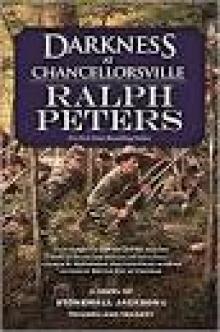 Darkness at Chancellorsville
Darkness at Chancellorsville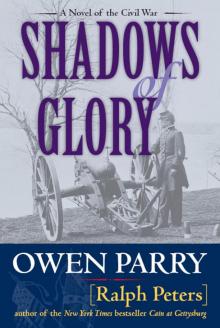 Shadows of Glory
Shadows of Glory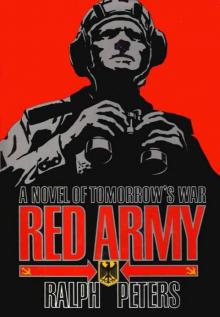 Red Army
Red Army Cain at Gettysburg
Cain at Gettysburg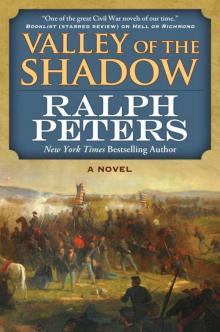 Valley of the Shadow: A Novel
Valley of the Shadow: A Novel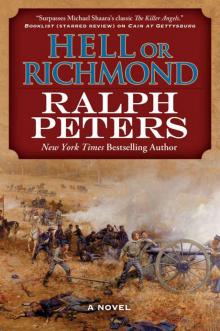 Hell or Richmond
Hell or Richmond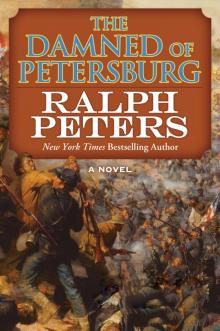 The Damned of Petersburg
The Damned of Petersburg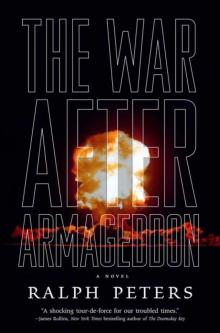 The War After Armageddon
The War After Armageddon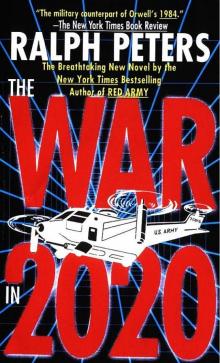 The War in 2020
The War in 2020